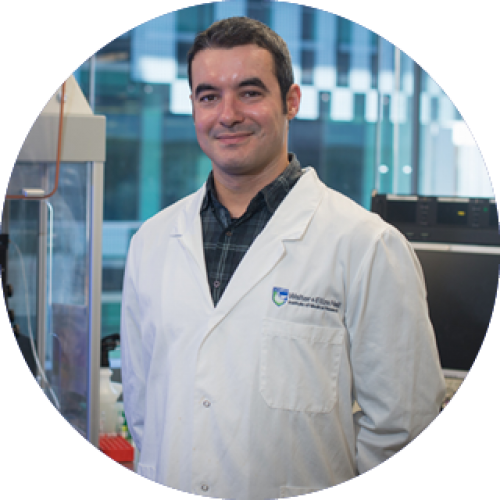
Immunotherapy
University of Queensland Diamantina Institute
Strengthening immunotherapy to fight 'natural killers'
Dr Fernando Guimaraes is focused on immunology research, particularly into cells that constantly monitor, recognise and kill other, altered cells in the body – known in medicine as the natural-killer (NK) lymphocytes.
Fernando seeks to continue previous research into how the immune system can control the spread of cancer, with the aim of ultimately identifying “breakthrough science” that can stimulate the body’s immune system to achieve this.
To this end also, after postdoctoral training at the Walter & Eliza Hall Institute of Medical Research (WEHI) in Melbourne, Fernando was recently appointed a group leader at the University of Queensland Diamantina Institute (UQDI) in Brisbane. The UQDI is a research facility that lays claim to world-changing discoveries such as the world’s first cervical cancer vaccine.
The Research
Just seven years after his PhD in Paris, Brazilian-born Fernando has made some thrilling discoveries. With the funding support of Cure Cancer, he has discovered chemicals produced by tumours that prevent NKs from recognising and killing tumour cells. These discoveries pave the way for new drugs that may stop tumours from “hiding” from NK cells and spreading, he says.
He has also become recognised as an emerging leader in his field, having been chosen 2019 Researcher of the Year by Cure Cancer Australia (and 2018 runner up). His work was recently reviewed for the journal Trends in Immunology, which highlighted his contribution on its cover.
Despite advances in treatment and early detection, metastasis remains a leading cause of cancer-related death, Fernando says, and studies over the past decade have reinforced the role the immune system can play. As evidence he points to the granting of the 2018 Nobel Prize in physiology or medicine for the discovery of new “checkpoints” in tumour immunology. Inhibitors for these checkpoints are now approved by the US Food and Drug Administration and routinely employed during clinical treatment.
The Importance of Funding
“Medical researchers’ journeys are never easy,” Fernando reflects. “To succeed, they must be motivated, ambitious, curious, ethical, hardworking, open-minded, respectful and tolerant.”
Moreover, competition for funding is always tough. “That’s why new early-career grants like the Cure Cancer emerging investigator initiative are a priceless opportunity for scientists and undoubtedly provided the resources that helped me become a group leader in Australia,” he says.
In his work the grants are especially helpful, because research using a patient’s own immune system is risky and expensive, he adds. Government funds are not enough to develop all promising projects, so fundraising can make a big difference.
To contribute himself, Fernando has been involved in fundraising activities and events including The Weekend to End Women’s Cancer and the Ride to Conquer Cancer. He also served as a committee member of the Melbourne Immunotherapy Network, where for the past three years he has organised public cancer research forums to raise awareness of investigations into immunotherapy, and to raise funds for Cure Cancer.
“I understand how hard raising money is because I’ve done it!” he says, “I appreciate the efforts of Can Too and others who’ve worked so hard to make promising project grants from Cure Cancer become possible.”



